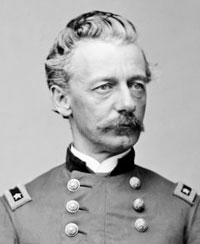
Henry Warner Slocum (1827-1894)
Henry Warner Slocum (September 24, 1827 - April 14, 1894), was a United States politician who served in the House of Representatives from New York. Slocum was also a distinguished military officer who served in the Union army during the Civil War.
Slocum was born in Delphi, New York. He graduated from the United States Military Academy at West Point and was commissioned a second lieutenant, 1st U.S. Artillery on July 1, 1852.
He served in the Seminole War and was promoted to first lieutenant on March 3, 1855. He resigned his commission October 31, 1856, and settled in Syracuse, New York.
Slocum had studied law while in the army. He was admitted to the bar in 1858 and practiced in Syracuse. He was elected to the State assembly in 1859.
At the outbreak of the Civil War, he was appointed colonel of the 27th New York Infantry regiment. He led the regiment at the First Battle of Bull Run, where he was wounded.
In August, 1861, he was appointed brigadier general of volunteers and commanded the 2nd Brigade, 1st Division, I Corps during the Peninsula Campaign and the 1st Division, VI Corps at the Seven Days Battles.
He was appointed major general of volunteers in July, 1861, and, still in command of the 1st Division, he led it at the Second Battle of Bull Run and the Battle of South Mountain.
He assumed command of the XII Corps during the Battle of Antietam when its commander, Maj. Gen. Joseph K. Mansfield, was killed. He led the corps in the Battle of Fredericksburg (where he fortunately arrived too late on the scene to see any real action in that Union catastrophe) and the Battle of Chancellorsville.
When Joseph Hooker was relieved of command of the Army of the Potomac, Slocum, being one of the most senior officers in the army, was in line for command. However, he and the other senior ranking officer, John Sedgwick, turned down command and agreed to serve under George G. Meade.
At the Battle of Gettysburg, Slocum received criticism for his corps' slow march to the battlefield. Some historians believe he could have mitigated the rout of the XI Corps if he had arrived earlier than 6 pm. As the ranking general on the field, he commanded the army for about six hours on July 1, 1863, until Meade arrived after midnight. Meade planned an attack from the Power's Hill area into the Confederate left flank, to be led by Slocum the following day, utilizing the V Corps and the XII Corps as the army's "right wing." Slocum resisted the suggestion, claiming the terrain was too difficult for an assault, but he continued to fancy himself the right wing commander for the rest of the battle, leaving Maj. Gen. Alpheus S. Williams temporarily in command of his XII corps during this period. When Meade ordered Slocum to send the entire XII Corps to assist the defense against James Longstreet's assault on the Union right flank on July 2, 1863, Slocum wisely recommended holding one brigade back in its position on Culp's Hill. This brigade, under Brig. Gen. George S. Greene, was able to hold out against a massive Confederate assault and saved the critical hill for the Union.
After Gettysburg, remnants of the XI Corps and XII Corps were combined to form the new XX Corps and it was sent to Tennessee in the Western Theater, under the command of Joseph Hooker. When Slocum found out he was going to be serving under Hooker he threatened to resign, but served with distinction at the Battle of Lookout Mountain.
In May, 1864, he was placed in command of the post at Vicksburg, Mississippi. When Hooker resigned from the army in 1864, William T. Sherman selected Slocum to replace him in command of the XX Corps. When Atlanta fell to Sherman, Slocum's corps was the first to enter the city on September 2, 1864. Sherman placed Slocum in command of the newly created Army of Georgia, which he led in the March to the Sea. During the Carolinas Campaign, Slocum's army was heavily engaged at the Battle of Averasborough and the Battle of Bentonville.
Slocum ran unsuccessfully as the Democratic candidate for secretary of state of New York, but was elected as a Democrat to the Forty-first and Forty-second Congresses, (March 4, 1869 - March 3, 1873). He was not a candidate for renomination in 1872. Instead, he resumed the practice of law in Syracuse.
He was appointed president of the department of city works of Brooklyn, New York in 1876. He was again elected as a Representative at Large from New York to the Forty-eighth Congress (March 4, 1883 - March 3, 1885).
He was president of the Board of Trustees of the New York State Soldiers' and Sailors' Home in Bath, New York, and was a member of the Board of Gettysburg Monuments Commissioners.
Henry Slocum died in Brooklyn, New York and is interred at Green-Wood Cemetery. A steamship, the General Slocum, was named for him, as was Fort Slocum.